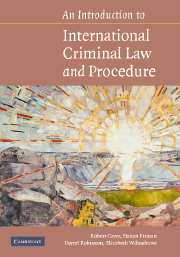Book contents
- Frontmatter
- Contents
- Preface
- Table of Cases
- Table of Treaties
- Table of Abbreviations
- Part A Introduction
- Part B Prosecutions in National Courts
- 3 Jurisdiction
- 4 National Prosecutions of International Crimes
- 5 State Cooperation with Respect to National Proceedings
- Part C International Prosecutions
- Part D Substantive Law of International Crimes
- Part E Principles and Procedures of International Prosecutions
- Part F Relationship Between National and International Systems
- Index
- References
4 - National Prosecutions of International Crimes
- Frontmatter
- Contents
- Preface
- Table of Cases
- Table of Treaties
- Table of Abbreviations
- Part A Introduction
- Part B Prosecutions in National Courts
- 3 Jurisdiction
- 4 National Prosecutions of International Crimes
- 5 State Cooperation with Respect to National Proceedings
- Part C International Prosecutions
- Part D Substantive Law of International Crimes
- Part E Principles and Procedures of International Prosecutions
- Part F Relationship Between National and International Systems
- Index
- References
Summary
Introduction
International crimes are primarily intended to be prosecuted at the domestic level, although the 1948 Genocide Convention foresaw a possible ‘international penal tribunal as may have jurisdiction with respect to those Contracting Parties which shall have accepted its jurisdiction’. This has been described as an ‘indirect enforcement system’ whereby international criminal law is to be enforced through national systems. National prosecutions are not only the primary vehicle for the enforcement of international crimes, they are also often considered a preferable option – in political, sociological, practical, and legitimacy terms – to international prosecutions.
But although the world vowed after the Second World War never again to allow such atrocities to occur, they continue to be committed in many places around the world and domestic prosecutions are far apart. Indeed, the international criminal jurisdictions are an answer to the impunity that generally exists domestically. This chapter will address international obligations in this regard and some major legal issues that arise concerning national prosecutions of international crimes. Among the complicating factors, insufficient legislation, ne bis in idem (double jeopardy) and statutory limitations are addressed here, while amnesties are dealt with in Chapter 2, state cooperation in Chapter 5 and immunities in Chapter 20.
National prosecutions
Of the international crimes that are the subject of this book, war crimes have been regulated in domestic law the longest and have been prosecuted most often.
- Type
- Chapter
- Information
- Publisher: Cambridge University PressPrint publication year: 2007



